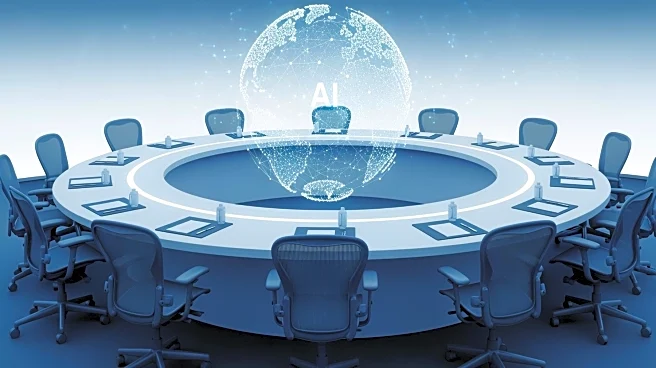What's Happening?
The London People Power Summit, held at Hilton Syon Park, focused on the evolving role of AI in recruitment and the future of work. Mabinty Asho, head of diversity, equity, inclusion, and belonging for
Comic Relief, emphasized the need for HR leaders to ensure that AI-driven hiring processes are inclusive and free from bias. With 67% of UK organizations already using AI in hiring, Asho warned that digital-first systems could embed bias if not carefully managed. She highlighted the potential of AI to remove barriers through features like live auto-captioning and voice-to-text, which support candidates with auditory or verbal communication challenges. The summit also addressed the future of work, with panelists agreeing that it will be human-centered, prioritizing equity, fairness, and productivity.
Why It's Important?
The discussions at the London People Power Summit underscore the critical role of AI in transforming recruitment processes to be more inclusive. As organizations increasingly rely on AI for hiring, there is a risk of perpetuating biases inherent in traditional recruitment methods. By focusing on inclusive design, AI can help break down barriers for candidates with diverse needs, promoting accessibility and equity in the workplace. This shift is crucial for fostering a diverse workforce that reflects broader societal values. The emphasis on human-centered work highlights the growing importance of trust, adaptability, and humanity in shaping the future of employment, which could lead to more ethical and responsive leadership practices.
What's Next?
Following the summit, HR leaders are expected to reassess their recruitment strategies to ensure AI tools are designed with inclusivity in mind. Organizations may implement measures to track hiring outcomes by demographic, ensuring equitable opportunities for all candidates. The focus on human-centered work suggests that future leadership roles will require greater awareness of staff sentiment and ethical considerations. As AI continues to evolve, HR professionals will need to balance technological efficiency with human judgment, ensuring that recruitment processes remain fair and transparent. The summit's insights may prompt further discussions on the role of AI in shaping workplace culture and employee engagement.
Beyond the Headlines
The summit's focus on AI and inclusivity raises important ethical considerations about the use of technology in recruitment. As AI becomes more integrated into hiring processes, organizations must navigate the complexities of ensuring fairness and avoiding bias. This development may lead to broader cultural shifts within HR practices, emphasizing the need for continuous oversight and adaptation. The emphasis on human-centered work also reflects a growing recognition of the importance of employee well-being and ethical leadership, which could influence long-term changes in organizational culture and values.









